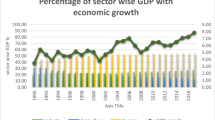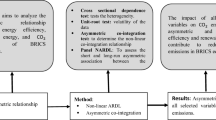Abstract
Nowadays, BRICS (i.e., Brazil, Russia, India, China, and South Africa) becomes more and more important in the world in terms of not only economic development, but also energy consumption. The purpose of this paper is to study occurrence of a decoupling between economic growth and energy-related CO2 emission in BRICS countries from 1995 to 2014. Furthermore, the LMDI theory is utilized to find the decoupling reasons. The main conclusions drawn from the present study may be summarized as follows: (1) During the study period, China was the largest CO2 emitter among BRICS countries; per capita energy-related CO2 emission in Russia was the largest in BRICS countries. (2) The share of fossil energy to total energy consumption for South Africa accounted for more than 96 %. However, the share of fossil energy to total energy consumption for Brazil accounted for about 60 % over the study period. (3) For Brazil, Russia, and South Africa, five decoupling status occurred during the study period. However, only three decoupling status occurred in China and India. (4) The energy intensity effect played a positive role in decreasing CO2 emission in all five BRICS countries.







Similar content being viewed by others
References
Al-Ghandoor A, Al-Hinti I, Mukattash A, Al-Abdallat Y (2010) Decomposition analysis of electricity use in Jordanian industrial sector. Int J Sustain Energy 29:233–244
Ang BW (2004) Decomposition analysis for policymaking in energy: which is the preferred method? Energy Policy 32:1131–1139
Ang BW, Zhang FQ (2000) A survey of index decomposition analysis in energy and environmental analysis. Energy 25:1149–1176
Climent F, Pardo A (2007) Decoupling factors on the energy–output linkage: the Spanish case. Energy Policy 35:522–528
Cowan WN, Chang TY, RoulaInglesi-Lotz R, Gupta R (2014) The nexus of electricity consumption, economic growth and CO2 emissions in the BRICS countries. Energy Policy 66:359–368
Diakoulaki D, Mandaraka M (2007) Decomposition analysis for assessing the progress in decoupling industrial growth from CO2 emissions in the EU manufacturing sector. Energy Econ 29:636–664
Fifth BRICS Summit (2013) Thekweni declaration and action plan. www.brics5.co.za/fifth-brics-summit-declaration-and-action-plan
Freitas LC, Kaneko S (2011) Decomposing the decoupling of CO2 emissions and economic growth in Brazil. Ecol Econ 70:1459–1469
IPCC (2014) Greenhouse gas inventory: IPCC Guidelines for National Greenhouse Gas Inventories. United Kingdom Meteorological Office, Bracknell
Liu LC, Fan Y, Wu G, Wei YM (2007) Using LMDI method to analyze the change of China’s industrial CO2 emissions from final fuel use: an empirical analysis. Energy Policy 35:5892–5900
Ma C, Stern DI (2008) China’s changing energy intensity trend: a decomposition analysis. Energy Econ 30:1037–1053
OECD (Organization for Economic Co-operation and Development) (2010) Indicators to measure decoupling of environmental pressure from economic growth. Sustainable development. SG/SD (2002) 1/Final. http://www.olis.oecd.org/olis/2002doc.nsf/LinkTo/sg-sd(2002)1-final. Accessed 25 Aug 2010
Pao HT, Tsai CM (2010) CO2 emissions, energy consumption and economic growth in BRIC countries. Energy Policy 38:7850–7860
Song ML, Zhang LL, Liu W, Fisher R (2013) Bootstrap-DEA analysis of BRICS’ energy efficiency based on small sample data. Appl Energy 112:1049–1055
Tapio P (2005) Towards a theory of decoupling: degrees of decoupling in the EU and the case of road traffic in Finland between 1970 and 2001. Transp Policy 12:137–151
Vehmas J, Malaska P, Luukkanen J, Kaivo-oja J, Hietanen O, Vinnari M, Ilvonen J (2003) Europe in the global battle of sustainability: Rebound strikes back?—Advanced sustainability analysis, publications of the Turku School of Economics and Business Administration, Series discussion and working papers 7:2003, Turku
Wang WW, Liu X, Zhang M, Song XF (2014) Using a new generalized LMDI (logarithmic mean Divisia index) method to analyze China’s energy consumption. Energy 67:617–622
WB (World Bank) (2015). http://data.worldbank.org/frontpage
Zhang ZX (2000) Decoupling China’s carbon emissions increase from economic growth: an economic analysis and policy implications. World Dev 28:739–752
Zhang M, Guo FY (2013) Analysis of rural residential commercial energy consumption in China. Energy 52:222–229
Zhang M, Wang WW (2013a) Decouple indicators on the CO2 emission-economic growth linkage: the Jiangsu Province case. Ecol Ind 32:239–244
Zhang M, Wang WW (2013b) Decoupling analysis of electricity consumption from economic growth in China. J Energy South Afr 24:57–66
Zhang M, Dai S, Song Y (2015a) Decomposition analysis of energy-related CO2 emissions in South Africa. J Energy South Afr 26(1):67–73
Zhang M, Song Y, Su B, Sun XM (2015b) Decomposing the decoupling indicator between the economic growth and energy consumption in China. Energy Efficiency. doi:10.1007/s12053-015-9348-0
Zhong TY, Huang XJ, Han L, Wang BY (2010) Review on the research of decoupling analysis in the field of environments and resource. J Nat Resour 25:1400–1412
Acknowledgments
The authors gratefully acknowledge the financial support from the Fundamental Research Funds for the Central Universities (2015XKMS089), Natural Science Foundation of China (71403266, 51309253), China Postdoctoral Science Foundation (2013M541752, 2015M580484, 2016T90517), Qing Lan Project of Jiangsu Province, and the Fundamental Research Funds for the Central Universities (2013W04). The authors also would like to thank the anonymous referees for their helpful suggestions and corrections on the earlier draft of our paper.
Author information
Authors and Affiliations
Corresponding author
Rights and permissions
About this article
Cite this article
Dai, S., Zhang, M. & Huang, W. Decomposing the decoupling of CO2 emission from economic growth in BRICS countries. Nat Hazards 84, 1055–1073 (2016). https://doi.org/10.1007/s11069-016-2472-0
Received:
Accepted:
Published:
Issue Date:
DOI: https://doi.org/10.1007/s11069-016-2472-0




